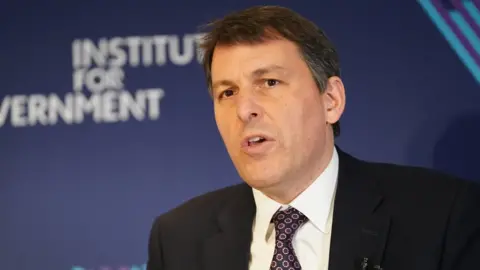Civil Service must do more with less, minister John Glen says
 PA Media
PA MediaThe Civil Service must "do more with less" and make better use of technology to improve the efficiency of government, a minister has said.
In a speech setting out his plans for reform, Cabinet Office Minister John Glen said he wanted "a smaller, more skilled Civil Service", with strong performance rewarded with higher pay.
But he added that those underperforming must be "let go more swiftly".
Unions said uncompetitive pay rates were to blame for high staff turnover.
Dave Penman, general secretary of the FDA union, which represents senior civil servants, said: "If the minister is serious about a better rewarded civil service, then this year's pay round will be the perfect opportunity for him to show it."
Last year, Chancellor Jeremy Hunt announced plans to freeze the expansion of the civil service and reduce staff numbers to pre-pandemic levels, saying this could save £1bn a year.
In a speech at the Institute for Government think tank's annual conference in London, Mr Glen said the Civil Service needed to embrace technology and artificial intelligence (AI) to reduce bureaucracy and deliver public services at a lower cost.
Amid concerns about high vacancy rates, he said the government was reviewing pay frameworks for digital and data professionals to ensure they were competitive with similar private sector roles.
As well as helping to attract and retain talent, he argued this would save the taxpayer money by reducing reliance on expensive contractors.
He also announced a review of the Civil Service's approach to performance management, saying poor performance amongst a minority of staff must be addressed.
"In some cases, consistently underperforming staff can languish in roles or move between departments, without properly addressing the reasons for poor performance," he said.
"In the worst cases managers can too often feel unable to remove consistently poor performers."
He reiterated his view that working in the office rather than from home helped staff to be more productive and efficient.
In November, civil servants were told they should spend at least 60% of their working week in the office, with Mr Glen saying senior leaders "needed to set an example" on this.
Meanwhile, he announced there would be new guidance on staff diversity networks, which raise awareness of the barriers faced by underrepresented groups.
He said the networks helped make the Civil Service more "open and inclusive", but managing them "should not become a second job" and they must not undermine impartiality rules.
The minister denied he was trying to stoke "culture wars", but said it was important work for networks did not take up "a disproportionate amount of time".
